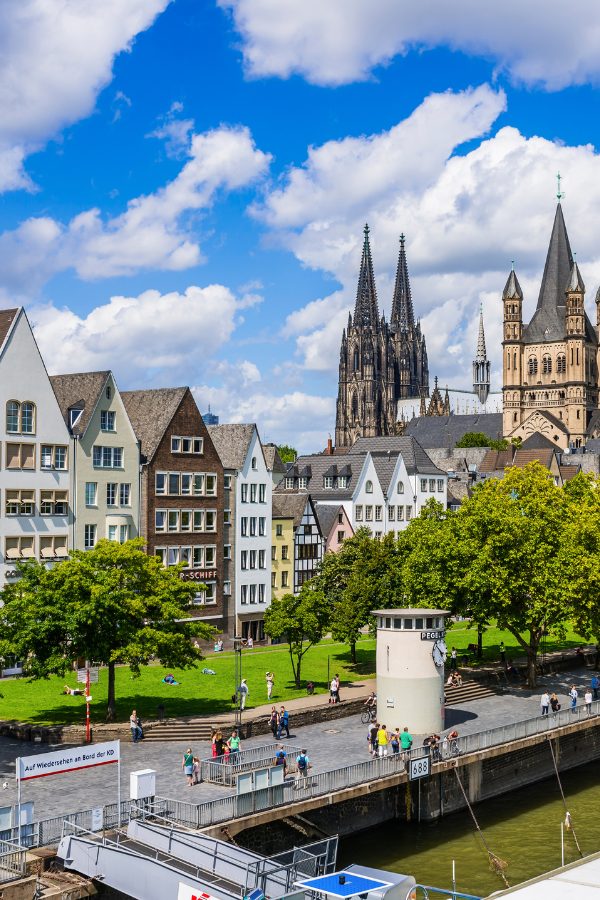

What is a Working Holiday, and How Do You Apply for a Visa Abroad?
Summary
Embark on a Working Holiday to explore new cultures, gain international work experience, and grow personally and professionally. This adventure offers young women the chance to develop invaluable skills, enhance language proficiency, and build a global network, all while experiencing the thrill of living and working abroad. Whether it’s in bustling cities or tranquil countrysides, a Working Holiday can dramatically enrich your life and career.
Reflection Questions
- What are your main motivations for considering a Working Holiday, and how do you believe it will impact your personal and professional life?
- What fears or reservations do you have about living and working in a foreign country, and what steps can you take to overcome them before your departure?
- How do you envision using the skills and experiences gained from a Working Holiday in your future career or personal aspirations?
Journal Prompt
Imagine you have returned from your year abroad. Write a detailed entry about how the experience has transformed you. Consider changes in your confidence, world view, professional skills, and personal relationships. How have these changes shaped the person you are now, and how do you plan to integrate these new aspects of yourself into your future endeavors?
Taking a Working Holiday is an enriching opportunity for anyone eager to blend travel with valuable work experience—particularly beneficial for women looking to broaden their horizons and enhance their careers. This transformative experience not only allows you to immerse yourself in new cultures and communities but also provides a platform for significant personal and professional growth. Through a variety of job opportunities abroad, you can develop crucial skills, build international connections, and gain a competitive edge in the job market. A working holiday can have a profound impact on your life’s trajectory, empowering you to become more independent, culturally adept, and professionally versatile. If you’re ready to embark on an adventure that enriches your life and career, a Working Holiday might just be your gateway to a world of possibilities. Read all about what this entails and how to begin below!
What is a Working Holiday?


Many of us refer to holidays we do not personally observe as “working holidays” (think Washington’s Birthday and other non-religious federal holidays). However, there’s another type of working holiday with which you might not be so familiar. This type of working holiday has nothing to do with the paid leave days that most federal employees take off if a holiday falls on a Saturday, or those that are exempt from regularly scheduled PTO. It’s also completely unrelated to Christmas Day, Veterans Day, Thanksgiving Day, or any other observance.
A Working Holiday is also a unique type of travel arrangement that allows young adults, typically between the ages of 18 and 30, to explore a foreign country while working legally to fund their stay. This visa program is designed to facilitate cultural exchange and educational experiences, offering participants the chance to immerse themselves in a different culture by living and working there for an extended period, usually up to one or two years. It’s not available to your average tourist. The idea is to provide a balanced experience that combines travel with work opportunities in sectors like hospitality, retail, or agriculture, depending on the host country’s regulations and available jobs.
The appeal of a Working Holiday lies in its dual benefit: travelers not only gain the freedom to explore new landscapes and lifestyles but also acquire practical work experience and skills that can enhance their resumes. This program is particularly popular among students and recent graduates looking to gain international exposure and practical skills before settling into their career paths.
Countries around the world, including Australia, Canada, New Zealand, and several European nations, offer Working Holiday visas to promote this cultural and professional exchange, making it a compelling option for young people seeking adventure with a purpose.
Why Consider a Working Holiday?


Considering a Working Holiday is an attractive option for young travelers and adventurers looking to enrich their lives with experiences that extend beyond conventional tourism. This program allows individuals to not only visit a new country but also to live there for an extended period, offering a deeper understanding and appreciation of the local culture, customs, and community.
It’s an ideal choice for those who wish to break away from the typical paths of education and career for a while, exploring the world before committing to the next stages of their professional lives. The opportunity to work part-time or full-time while traveling helps participants financially sustain their adventures, making diverse and often expensive destinations more accessible.
Moreover, a Working Holiday is about personal and professional growth. It challenges young adults to adapt to new environments, solve problems independently, and enhance their social and professional networks internationally. Such experiences are invaluable in today’s globalized world, where cultural adaptability and international experience are increasingly seen as significant assets by employers across various industries.
Additionally, this journey offers a chance to develop language skills and professional abilities in real-world settings, providing a competitive edge in the job market upon return. For many, a Working Holiday turns into a life-changing endeavor that broadens horizons, builds resilience, and fosters a sense of adventure and self-discovery.
Eligibility Criteria for a Working Holiday Visa
Age and Nationality Requirements


The eligibility for a Working Holiday visa typically hinges on age and nationality, with most programs targeting young adults aged between 18 and 30, though some countries may extend this to 35. These age limits are set to promote youth mobility and cultural exchange.
Nationality is also crucial as these agreements are reciprocal between specific countries, meaning applicants must hold a passport from nations that have established Working Holiday agreements with the host country. This reciprocity ensures a balanced exchange of visitors between the participating countries, fostering mutual cultural understanding.
Financial Requirements
Financial stability is a key requirement for securing a Working Holiday visa, as applicants must demonstrate they have sufficient funds to support themselves at the beginning of their stay. This requirement helps ensure that participants are not solely reliant on finding immediate employment to sustain their visit, thereby reducing the risk of financial distress while abroad.
The exact amount required varies by destination but typically covers initial accommodations, daily needs, and return travel costs. Proof of these funds is usually needed at the time of application or on entry into the country.
Health and Character Requirements


Applicants for a Working Holiday visa must also meet certain health and character standards. Health requirements can include a medical examination to ensure that the individual does not carry any contagious diseases that might pose a public health risk.
Character requirements involve a background check to confirm that the applicant has no serious criminal convictions. Both sets of checks are intended to protect the safety and well-being of both the visitors and the host country’s residents, ensuring that those entering the country will contribute positively to the community and comply with local laws.
Benefits of a Working Holiday


A Working Holiday offers unparalleled opportunities for cultural exchange and personal growth, as participants immerse themselves in an entirely new environment and way of life. This immersion allows for a deeper understanding and appreciation of another culture through everyday interactions, from local customs and food to social norms and community activities.
Such experiences not only broaden one’s perspectives but also foster significant personal development. Participants learn to navigate and adapt to diverse situations, enhancing their resilience and independence. This personal evolution often leads to increased self-confidence and a greater understanding of one’s capabilities and aspirations, which can have profound long-term benefits on personal and professional levels.
Professional Development


Working Holidays are not just about travel; they also offer tangible benefits for professional development. Participants gain access to a variety of job opportunities that might not be available in their home countries. This work experience can be invaluable, providing insights into international business practices and enhancing job skills in areas such as communication, teamwork, and problem-solving in diverse settings.
Moreover, these experiences can be added to a resume, showcasing an individual’s versatility and ability to adapt to new challenges. This can be particularly appealing to prospective employers in an increasingly global job market where international experience is often regarded as a significant asset.
Language and Networking


The impact of a Working Holiday on language skills and networking cannot be overstated. For many, this opportunity provides a practical environment to learn or improve a foreign language through daily interactions and work settings, which is far more effective than classroom learning. Enhanced language skills not only boost personal confidence but also open up further educational and professional opportunities.
Additionally, building a network of new friends and international contacts can provide significant professional advantages, such as potential job offers, partnerships, or insights into global markets. As they work abroad, these networks offer most employees support during the stay and valuable connections for future travels or business ventures.
Popular Destinations for Working Holidays


Numerous countries around the globe offer Working Holiday visas, each with its unique appeal and conditions. Popular destinations include Australia, Canada, New Zealand, Japan, South Korea, and various countries throughout Europe such as the United Kingdom, Ireland, France, and Germany. These programs are often reciprocal, meaning they are available to citizens of countries that similarly offer Working Holiday visas to their nationals.
The diversity of destinations allows participants to choose a country that best suits their interests and goals, whether they’re drawn to the bustling cities of Australia, the natural beauty of New Zealand, the cultural richness of Europe, or the technological allure of Japan and South Korea.
What Makes These Destinations So Appealing for Working Holidays?


Each destination country offers its unique attractions and opportunities which enhance the appeal of a Working Holiday experience. For instance, Australia is renowned for its stunning landscapes and outdoor activities, making it ideal for those who enjoy nature and adventure sports. Canada offers a mix of vibrant multicultural cities and spectacular natural settings, appealing to both urban explorers and nature lovers. New Zealand is a magnet for adventurers and fans of the great outdoors with its opportunities for hiking, skiing, and water sports.
In Europe, countries like Germany and France provide rich cultural experiences with their world-class museums, historical sites, and culinary delights. Japan, on the other hand, offers a blend of traditional and modern experiences, from ancient temples to cutting-edge technology, making it a fascinating destination for cultural and tech enthusiasts alike. Each location not only broadens the traveler’s world view but also enriches their life with experiences specific to that culture and environment.
Understanding the Application Process for a Working Holiday Visa


The application process for a Working Holiday visa generally begins with checking eligibility requirements specific to your home country and the intended destination. The next step involves filling out an application form, which can usually be done online through the official immigration or consulate website of the destination country.
After the application form, the process includes payment of a non-refundable application fee. Some countries may require applicants to attend an interview or provide biometric data as part of the application. Once all materials are submitted, the applicant must usually wait for notification from the immigration office, which may request additional documentation or information before making a final decision.
Required Documentation
The documentation required for a Working Holiday visa typically includes a valid passport with a minimum validity that extends beyond the return date, proof of sufficient funds to support the initial phase of the stay, and a return ticket or additional proof of funds to purchase one at the end of the stay.
Other common requirements are recent passport-sized photographs, an application form, and sometimes evidence of health insurance. Depending on the destination country, applicants might also need to provide police clearance certificates to prove they have no criminal records, along with medical examinations to satisfy health standards.
Visa Processing and Validity


The processing time for a Working Holiday visa can vary significantly by country but generally takes between a few weeks to a few months. Applicants are encouraged to apply well in advance of their intended departure date. The validity of a Working Holiday visa also varies but typically allows for a stay of 12 to 24 months, depending on the mutual agreement between the involved countries. Some visas may permit multiple entries into the country over the validity period, while others may be restricted to a single entry.
Planning Your Trip Abroad


Preparation for a Working Holiday involves several key arrangements to ensure a smooth and safe experience. Securing comprehensive travel insurance is crucial to cover unexpected medical costs and other travel-related risks. Finding accommodation, at least for the initial days, should be arranged before departure.
Additionally, researching job opportunities and applying in advance can provide financial stability soon after arrival. Utilizing online resources, forums, and social networks can also aid in connecting with potential employers and other travelers who can provide valuable insights and assistance.
Legal Considerations While on Working Holiday
Understanding and complying with the legal obligations in the host country is essential for anyone on a Working Holiday. This includes being aware of any work restrictions, such as limits on the type of employment or the duration one can work with a single employer.
Tax implications are also important; many countries require individuals on a Working Holiday visa to file for taxes if they earn above a certain amount. It’s advisable to familiarize oneself with these aspects through the host country’s government websites or consulting with legal experts to avoid any complications during the stay.
Final Thoughts on Taking a Working Holiday


A working holiday is a unique experience that not only allows you to explore new countries and cultures in depth but also offers substantial benefits such as enhancing your resume with international work experience and expanding your professional network across borders. Such an endeavor encourages independence, resilience, and self-discovery—all invaluable traits that can empower you personally and elevate your career prospects.
Whether it’s learning a new language, adapting to diverse workplace environments, or simply gaining confidence through solo travel, the challenges and rewards of a Working Holiday can significantly shape your personal and professional life. If you’re yearning for a change of scenery, keen to test your limits, and eager to add global experience to your skill set, a Working Holiday could be the perfect next step.








